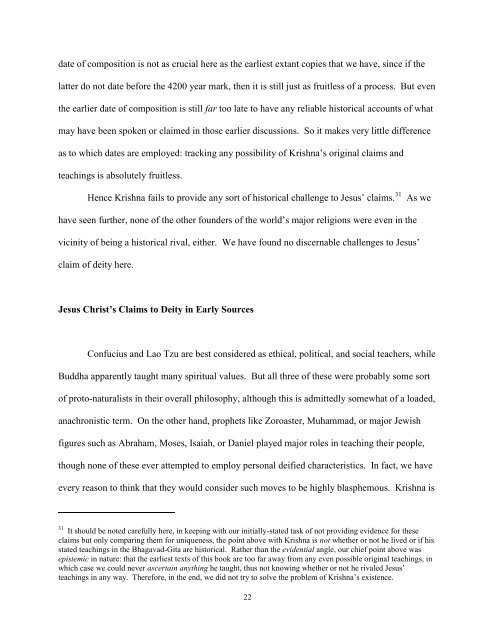Published by
299z7CN
299z7CN
You also want an ePaper? Increase the reach of your titles
YUMPU automatically turns print PDFs into web optimized ePapers that Google loves.
date of composition is not as crucial here as the earliest extant copies that we have, since if the<br />
latter do not date before the 4200 year mark, then it is still just as fruitless of a process. But even<br />
the earlier date of composition is still far too late to have any reliable historical accounts of what<br />
may have been spoken or claimed in those earlier discussions. So it makes very little difference<br />
as to which dates are employed: tracking any possibility of Krishna’s original claims and<br />
teachings is absolutely fruitless.<br />
Hence Krishna fails to provide any sort of historical challenge to Jesus’ claims. 31<br />
As we<br />
have seen further, none of the other founders of the world’s major religions were even in the<br />
vicinity of being a historical rival, either. We have found no discernable challenges to Jesus’<br />
claim of deity here.<br />
Jesus Christ’s Claims to Deity in Early Sources<br />
Confucius and Lao Tzu are best considered as ethical, political, and social teachers, while<br />
Buddha apparently taught many spiritual values. But all three of these were probably some sort<br />
of proto-naturalists in their overall philosophy, although this is admittedly somewhat of a loaded,<br />
anachronistic term. On the other hand, prophets like Zoroaster, Muhammad, or major Jewish<br />
figures such as Abraham, Moses, Isaiah, or Daniel played major roles in teaching their people,<br />
though none of these ever attempted to employ personal deified characteristics. In fact, we have<br />
every reason to think that they would consider such moves to be highly blasphemous. Krishna is<br />
31 It should be noted carefully here, in keeping with our initially-stated task of not providing evidence for these<br />
claims but only comparing them for uniqueness, the point above with Krishna is not whether or not he lived or if his<br />
stated teachings in the Bhagavad-Gita are historical. Rather than the evidential angle, our chief point above was<br />
epistemic in nature: that the earliest texts of this book are too far away from any even possible original teachings, in<br />
which case we could never ascertain anything he taught, thus not knowing whether or not he rivaled Jesus’<br />
teachings in any way. Therefore, in the end, we did not try to solve the problem of Krishna’s existence.<br />
22


